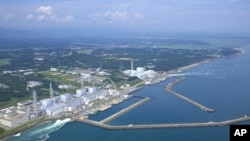Japanese officials say they have stopped radioactive water from leaking from the crippled Fukushima nuclear power plant.
The Tokyo Electric Power Company said they had plugged the leak Wednesday morning at 5:38 local time by injecting liquid glass and another substance into the soil near a cracked maintenance pit holding the contaminated water.
The Japanese news agency NHK said the utility planned to check for any further leaks.
Tuesday, before the flow was completely stopped, TEPCO said their tests showed the radioactive iodine levels in the sea near Fukushima plant were already going down, from 7.5 million times the legal limit Saturday, to 5 million times the legal limit Monday.
TEPCO, which operates the plant, says a separate 2,800 tons of radioactive water had been pumped into the sea from a temporary storage facility by Tuesday morning. The company plans to empty 10,000 tons of water from the tank to make room for water that is much more contaminated and preventing repair work.
South Korea, which lies west of Japan, has said it is concerned radioactive water could reach its shores. Japanese Foreign Minister Takeaki Matsumoto, however, says Japan has done everything to minimize the contamination of the ocean and promised to inform the international community of its decisions in accordance with United Nations regulations. The government says the radioactive water dumped into the sea does not pose any immediate health hazards or violate international maritime law.
Japan says elevated levels of radioactivity have been detected for the first time in fish south of the plant. The government on Tuesday established an allowable standard for radioactivity in seafood that matches standards for vegetables.
But India announced it was blocking all food imports from Japan for three months because of concerns about radiation contamination. India is the first country to impose a blanket ban on Japanese products, though other countries have suspended imports from the areas close to the earthquake- and tsunami-damaged nuclear plant.
Prime Minister Naoto Kan said Tuesday that the national government will take ultimate responsibility for the damage caused by the disaster.
Radioactivity levels in waters near the plant are many times higher than levels detected a week ago, when it became clear that contaminated water was leaking from the plant.
Concern about TEPCO's troubles drove share prices in the power utility below an all-time low recorded in 1951.
The contaminated water in the basements of several of the plant's six reactors is preventing workers from restarting the plant's critical cooling systems. The government has asked Russia to send a special radiation treatment ship to help dispose of some of the water.
General Electric's Chief Executive Officer Jeffrey Immelt, whose company designed parts of the Fukushima plant, said Monday that 1,000 engineers from GE and its partner, Hitachi, are trying to help mitigate the disaster.
The nuclear crisis has distracted attention from the enormous job of helping survivors from the quake and tsunami, which washed away whole towns and villages along Japan's northeastern coast. More than 27,500 people are dead or missing, while almost 160,000 people are living in temporary shelters.
Some information for this report was provided by AP.




